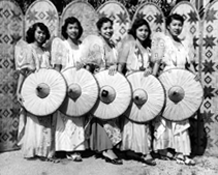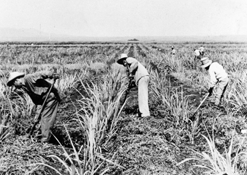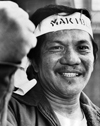


UNHEARD VOICES PROJECT
Pete
Tagalog
Pete Tagalog was born in Waipahu, Hawaii, on March 2, 1932. He was raised on a sugar cane plantation, where his father worked in the mill while his mother earned money washing the clothes of plantation workers. Because the public schools did not teach him basic skills, he had a hard time as a community college student. His talent and skills at community organizing became evident in 1972 when a developer tried to evict him and other residents of Ota Camp. In these interviews, Pete reflects on how Ota Camp residents resisted the eviction and why they united to preserve a rural lifestyle. He gives tribute to the older men in Ota Camp who made him understand Filipinos and their culture, and he feels gratitude to these older men who supported him absolutely as their spokesperson.
INTERVIEWER:
Melinda Tria Kerkvliet arrived in Hawaii in 1971. She participated in several anti-development protests in the 1970s, including those at Ota Camp, Chinatown and Waihole-Waikane. She has a Ph.D. in history from the University of Hawaii and has written a book on Filipino labor leader, Pablo Manlapit: Unbending Cane: Pablo Manlapit, A Filipino Labor Leader in Hawaii. In 1972 she participated in establishing Operation Manong, a federally-funded project which hired Filipino college students to tutor Filipino students at the public schools. The project has since broadened its scope and is now part of the University of Hawaii-Manoa as the Office of Multicultural Student Services.
Oral History Interview 09-01-2008
Oral History Interview 09-15-2008
PHOTOGRAPHS:
All photographs noted with (code, photographer) are provided through the courtesy of the Honolulu Star-Bulletin. Please credit the Honolulu Star-Bulletin (SB) or Honolulu Advertiser (AD), the photographer and eFIL when using these photographs:
Pete
Tagalog, Makibaka, 1972 (SB, Albert Yamaguchi)
Pete Tagalog, State Capitol Demonstration, 1972 (AD, David Yamada)
Ota Camp, 1972 (SB, John Titchen)
Ota Camp Community Center maintenance, 1973 (SB, John Titchen)
Makibaka Village (new Ota Camp), 1975 (SB, John Titchen)
Makibaka Village (new Ota Camp) overview, 1985 (SB, Dean Sensui)
The views and opinions contained in each oral history are solely those of the interviewee and interviewer and not necessarily those of eFIL, FAHSOH, FilCom, OMSS, HCH or the University of Hawaii.
HOME
|
Filipino-American
Historical Society of Hawaii
|
Help
Exhibits
| Publications
|
Collections
| Student/Teachers
Welcome
| About
| News
& Updates |
Giving
| Contact
Us
Copyright © 2006 by the Filipino-American Historical Society of Hawaii.
